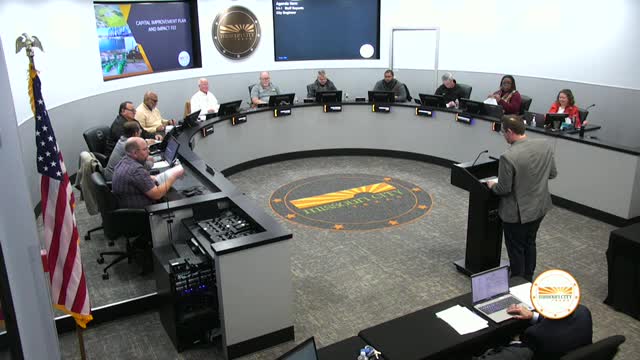Staff reports FY24 impact-fee collections, Mustang Bayou wastewater expansion nearing TCEQ sign-off
Get AI-powered insights, summaries, and transcripts
Subscribe
Summary
City staff updated the Planning and Zoning Commission on FY24 impact-fee collections and capital improvement plan oversight, reporting most new development fees are from the Mustang Bayou service area and noting the Mustang Bayou wastewater plant expansion is awaiting Texas Commission on Environmental Quality approval.
City staff on Thursday updated the Missouri City Planning and Zoning Commission on fiscal year 2024 collections of the city’s three impact fees and on capital improvement plan responsibilities, saying most new growth‑related revenue came from the Mustang Bayou service area and that the Mustang Bayou wastewater treatment plant expansion is nearly complete pending TCEQ approval.
The presenter told the commission the city has three impact-fee programs by ordinance: a Lake Olympia Parkway extension roadway fee, Mustang Bayou water and wastewater fees, and a Northeast Oyster Creek drainage fee. The presenter said the Lake Olympia roadway fee is used to reimburse the city’s upfront capital outlay for improvements along Lake Olympia Parkway. The Mustang Bayou fees pay debt service on bonds the city issued to build water and wastewater improvements, and the Northeast Oyster Creek drainage fee is held for future drainage improvements in the watershed around FM 1092 and Fifth Street.
Staff described FY24 receipts as concentrated in the Mustang Bayou service area on the city’s southeast side (the presenter named Fort Bend Town Center phases and the Amazon site as examples of nearby growth). The presenter said the city took in roughly $500,000 in water impact fees and nearly $1 million in wastewater impact fees for Mustang Bayou in FY24, and that wastewater fees were higher because of the larger capital need to expand the wastewater treatment plant. He said the Mustang Bayou wastewater plant was expanded from 0.95 million gallons per day (MGD) to 3 MGD and that the city is awaiting TCEQ approval for the final expansion work.
On the Lake Olympia fee, the presenter said fees were collected in FY24 for developments along that corridor but did not provide a precise breakdown beyond the figure reported in the staff presentation. For the Northeast Oyster Creek drainage fee, staff said there were no new impact-fee collections in FY24 because no new plats were issued in that area; staff said the current balance in the drainage account is relatively small (the presenter estimated it was around $30,000 but did not provide an audited figure in the meeting).
Staff explained how the city calculates fees: impact fees are tied to specific infrastructure costs or debt service and are converted to per‑unit charges using equivalent single‑family connection (ESFC) factors; meter size and land use type affect the ESFC conversion for non‑residential uses. The presenter noted some wastewater flows in the Mustang Bayou service area currently go to a Quail Valley Utility District treatment plant and that the city pays Quail Valley a pass‑through fee for those flows; as the city’s Mustang Bayou plant capacity is completed, staff said the city will review diverting flows into the city system so that future impact fees in that area would pay the city’s debt service rather than Quail Valley’s.
There was no action requested or taken on the presentation; staff said they are available to receive commission comments and will pass recommendations to city council if the commission wants changes to the city’s impact-fee or capital-improvement planning approach.
The same staff presenter later briefed the commission on the comprehensive plan update timeline; staff said a draft of findings and recommendations is expected in March and that a public open house would follow to gather public comment before a final draft is prepared for city council.
